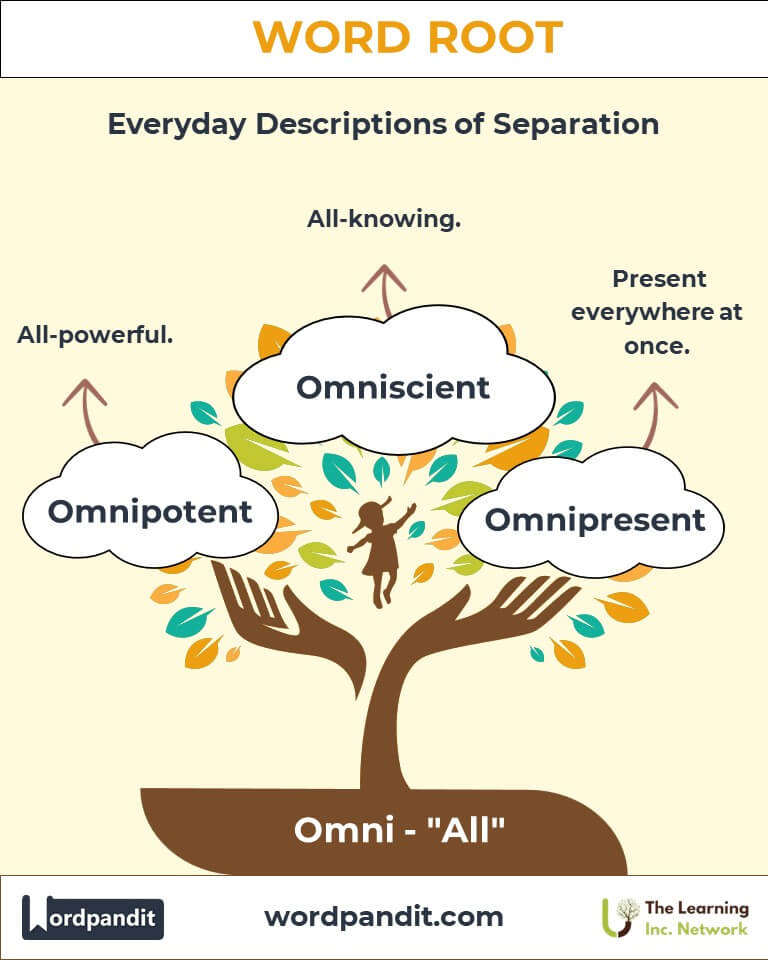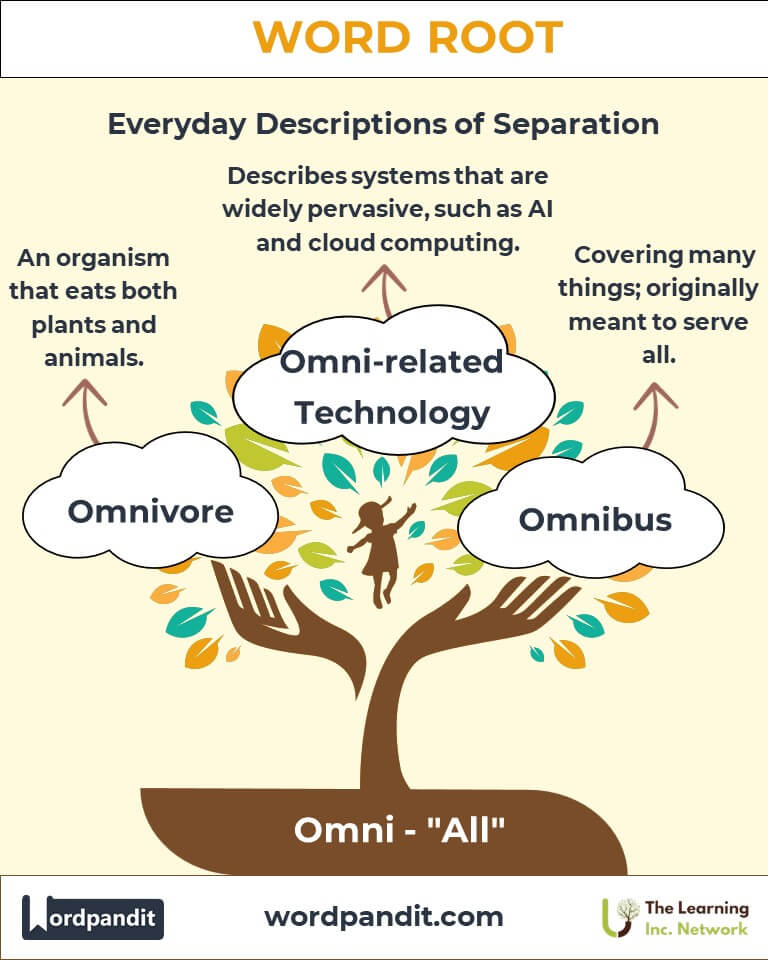Omni: The All-Encompassing Root of Universality
Byline:
Explore the boundless reach of the root "Omni," derived from Latin, meaning "all." From omnipotent rulers to omniscient narrators, "Omni" transcends boundaries, offering insights into universality and inclusivity across language and disciplines.

Table of Contents
- Introduction: The Universality of "Omni"
- Etymology and Historical Journey
- Mnemonic: Unlocking the Power of "Omni"
- Common "Omni"-Related Terms
- "Omni" Through Time
- "Omni" in Specialized Fields
- Illustrative Story: "Omni" in Action
- Cultural Significance of "Omni"
- The "Omni" Family Tree
- FAQs about the "Omni" Word Root
- Test Your Knowledge: "Omni" Mastery Quiz
- Conclusion: The Infinite Legacy of "Omni"
Introduction: The Universality of "Omni"
Imagine being everywhere, knowing everything, or having the power to do it all. Such is the essence of "Omni," pronounced "om-nee," a Latin root meaning "all." This versatile root forms the foundation of words that express inclusivity and universality, making it a cornerstone of philosophical, theological, and everyday language.
Etymology and Historical Journey
The root "Omni" originates from Latin, where it directly translates to "all" or "every." Ancient Roman texts often used it to emphasize totality or universality, as seen in omnis (everything) and omnipotens (all-powerful). Over time, "Omni" evolved into English and other languages, enriching vocabulary with its expansive connotations.
Mnemonic: Unlocking the Power of "Omni"
Picture an all-seeing eye overlooking the entire world, symbolizing "Omni" as a root encompassing all perspectives and possibilities.
Mnemonic Device:
"Omni means all-encompassing, from omnipotent gods to omniscient minds."
Common "Omni"-Related Terms
- Omnipotent
Pronunciation: om-nee-poh-tent
Definition: All-powerful.
Example: "The deity in the tale was omnipotent, capable of creating worlds with a mere thought." - Omniscient
Pronunciation: om-nee-shunt
Definition: All-knowing.
Example: "The omniscient narrator revealed the secrets of every character." - Omnivore
Pronunciation: om-nee-vore
Definition: An organism that eats both plants and animals.
Example: "Humans are omnivores, capable of thriving on diverse diets." - Omnipresent
Pronunciation: om-nee-prez-uhnt
Definition: Present everywhere at once.
Example: "The omnipresent surveillance cameras monitored every corner of the facility." - Omnibus
Pronunciation: om-nee-bus
Definition: Covering many things; a bus originally meant to serve all.
Example: "The omnibus bill addressed a wide range of policy issues."
"Omni" Through Time
- Omnipotens (Latin): First appeared in religious texts to describe deities with unlimited power.
- Omnivore (Modern Biology): Introduced in the 19th century, highlighting dietary flexibility in humans and animals.
- Omnipresent (Contemporary Usage): Gained traction in the digital age, describing ubiquitous technology like the internet.
"Omni" in Specialized Fields
- Theology:
- Omnipotent: Refers to divine beings with unlimited power.
- Relevance: Central to discussions on the nature of God in philosophy and religion.
- Biology:
- Omnivore: Describes species with diverse dietary habits.
- Application: Key to understanding ecological adaptability.
- Literature:
- Omniscient: Describes a narrative voice that knows everything about the story and characters.
- Technology:
- Omnipresent: Refers to pervasive systems like AI and cloud computing.
- Impact: Highlights the growing ubiquity of technology in modern life.
Illustrative Story: "Omni" in Action
Lila loved writing omniscient narratives, creating worlds where she controlled every perspective. One day, her stories caught the attention of an omnipresent AI, which helped her design a game showcasing omnivorous creatures in their natural habitats. Together, they created an immersive experience, blending creativity, knowledge, and technology—a true testament to the power of "Omni."
Cultural Significance of "Omni"
The root "Omni" has deep cultural resonance, from religious doctrines emphasizing omnipotence and omnipresence to literary devices showcasing omniscient storytelling. It symbolizes humanity’s aspiration for completeness, unity, and universal understanding.
The "Omni" Family Tree
- Pan (Greek): All or every.
- Example: Pandemic (affecting all people).
- Uni (Latin): One.
- Example: Universal (applying to all).
- Poly (Greek): Many.
- Example: Polymath (knowledgeable in many areas).

FAQs About the "Omni" Word Root
Q: What does "Omni" mean?
A: "Omni" is a Latin root meaning "all" or "every." It is used in terms like omnipotent, omniscient, and omnipresent to describe universality and inclusivity.
Q: What is the difference between omniscient and omnipotent?
A: "Omniscient" refers to being all-knowing, often used for narrators or deities. "Omnipotent" means having unlimited power, commonly used in theological discussions.
Q: How is "Omni" relevant in biology?
A: In biology, "omni" appears in terms like "omnivore," describing species that consume both plants and animals. This dietary adaptability is key to survival in diverse environments.
Q: What does "Omnipresent" mean in modern contexts?
A: "Omnipresent" means being present everywhere at once. It is often used to describe pervasive systems like the internet or surveillance technologies.
Q: What is an "Omnibus"?
A: "Omnibus" originally means "for all" in Latin. It can refer to a compilation covering various topics or a type of transportation designed to serve everyone, like a bus.
Test Your Knowledge: "Omni" Word Root Quiz
1. What does "Omni" mean?
2. Which term means "all-knowing"?
3. What is an omnivore?
4. What does "Omnipresent" describe?
5. Which word is commonly used in theology?
Conclusion: The Infinite Legacy of "Omni"
The root "Omni" symbolizes the human quest for universality, understanding, and inclusivity. From ancient philosophy to modern technology, its influence spans disciplines, reflecting a timeless aspiration to comprehend and encompass all. As our world grows more interconnected, the legacy of "Omni" continues to remind us of the power of universality in language and thought.











